Drug Rehab & Alcohol Rehab Aberdeenshire & Near Aberdeenshire
Quick Links for help with addiction in Aberdeenshire
- What is Drug & Alcohol Rehab Aberdeenshire or Near Aberdeenshire Like?
- How Can I Get a Loved One into Drug & Alcohol Rehab in Aberdeenshire?
- How Much Does Drug & Alcohol Rehab in Aberdeenshire Cost?
- Is Drug & Alcohol Rehab in Aberdeenshire Available Through the NHS?
- How Long Does Drug & Alcohol Rehab in Aberdeenshire Last?
- What Are the Differences Between NHS & Private Rehab Treatment in Aberdeenshire?
- What are the Differences Between Inpatient & Outpatient Rehab Treatment in Aberdeenshire?
- What Types of Therapies are Offered at Alcohol & Drug Rehab in Aberdeenshire?
- What is a Dual Diagnosis at Drug & Alcohol Rehab in Aberdeenshire?
- What Can I Do to Get Drug & Alcohol Rehab Help in Aberdeenshire Today?
Recent figures and findings have revealed that drug deaths in Scotland (particularly in Aberdeenshire) are rising, [1] causing concern throughout the region.
Aberdeenshire struggles with addiction, as does the rest of the UK, and it is an issue that needs proper rehab treatment to address.
If you are struggling with drug addiction, alcohol addiction or even a behavioural addiction like gambling, consider drug and alcohol rehab in Aberdeenshire and near Aberdeenshire.
There you can benefit from bespoke, high-quality drug and alcohol rehab care to help you begin your journey to recovery.
Call the Rehab Recovery team today on 0800 088 66 86. We’re here to listen and offer our support, night or day for advice on drug and alcohol rehab in Aberdeenshire and near Aberdeenshire.
What is Drug & Alcohol Rehab Aberdeenshire or Near Aberdeenshire Like?
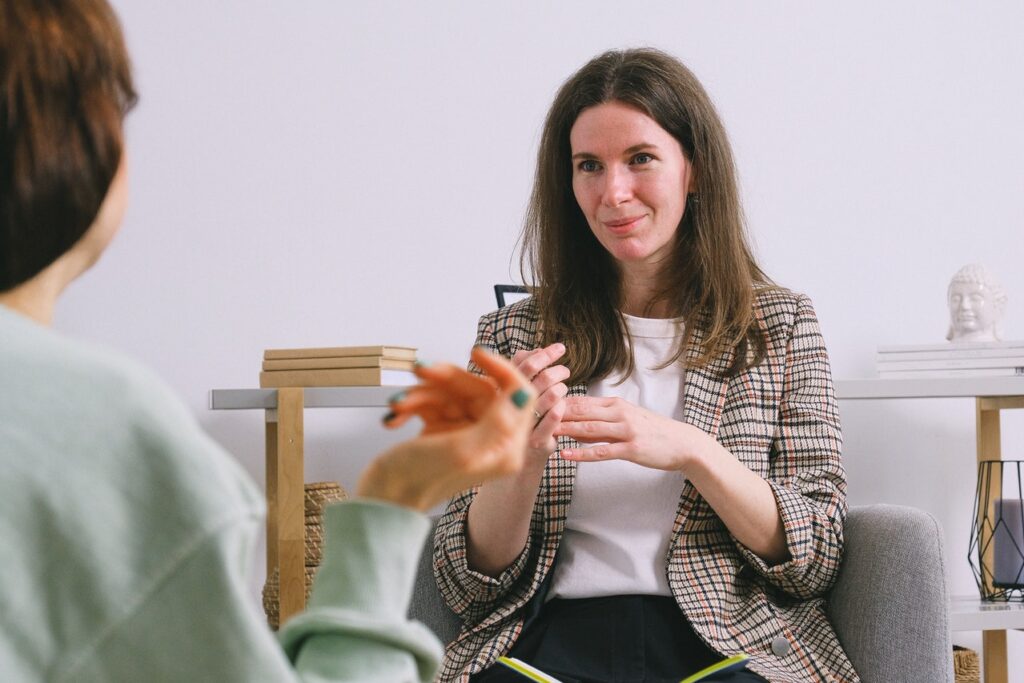
Woman in therapy session at a drug rehab & alcohol rehab in Aberdeenshire
Drug and alcohol rehabilitation also referred to as rehab for short, is the name given to a specialist drug and alcohol addiction treatment facility.
Here you can effectively practise abstinence and establish yourself to refrain from drug abuse in the future once drug and alcohol rehab treatment in Aberdeenshire has concluded.
Through a bespoke programme of tailored detoxification and rehab therapy treatments, you can overcome the physical and psychological effects of addiction and look forward to a better life.
Residential r=drug and alcohol rehab facilities are an excellent way to escape the stresses of home life, which for many people will fuel their addiction.
In the neutral and calming space of a residential drug and alcohol rehab facility in Aberdeenshire, you can benefit from around-the-clock support from people who understand what you’re going through, both from drug and alcohol rehab staff and other addiction sufferers.
Whilst not necessarily in Aberdeenshire, the UK is host to many luxury drug and alcohol rehab clinics that include rehab facilities such as swimming pools and saunas.
This helps make your time away from home as relaxing and rewarding as possible, increasing the chances of a successful drug and alcohol rehab stay.
Learn more about drug & alcohol rehab in Aberdeenshire by calling us on 0800 088 66 86
How Can I Get a Loved One into Drug Rehab & Alcohol Rehab in Aberdeenshire?

Older person holding hands with a younger person at a drug rehab and alcohol rehab in Aberdeenshire
Helping someone with an addiction source effective drug and alcohol rehab treatment can be challenging.
They may be very unwilling to seek professional drug and alcohol rehab assistance, or even deny the existence of their addiction entirely, leaving you worried and deflated.
At Rehab Recovery, we understand how difficult this can be. At this point, the best way to encourage a person to pursue rehab treatment in Aberdeenshire is often to stage an intervention.
Interventions are a great way to get your loved one to recognise the severity of their addiction and the effect it is having on their life as well as yours, encouraging them to pursue rehab help in Aberdeenshire.
Whilst they can be difficult – and at times unpleasant – they’re very effective in facilitating change in drug and alcohol addiction and encouraging full recovery through drug and alcohol rehab in Aberdeenshire.
We will help you get in touch with a professional interventionist familiar with the drug and alcohol rehab services available in Aberdeenshire. They will be able to plan and manage the intervention to give it the best chances of success.
Failing to prepare for an intervention could result in your loved one partaking in further addictive behaviour instead of attending rehab.
If a traditional confrontation is unlikely to produce promising effects, your Aberdeenshire interventionist will recommend a variety of different evidence-based approaches.
The CRAFT (Community Reinforcement And Family Training) Method [2] is the most widely recommended choice. Families use this method of positive reinforcement to gradually steer their loved ones away from substance abuse and towards drug and alcohol rehab.
For advice on how to guide a loved one towards drug & alcohol rehab in Aberdeenshire, talk to our experts on 0800 088 66 86
How Much Does Drug & Alcohol Rehab in Aberdeenshire Cost?

Man working on a laptop at a drug rehab & alcohol rehab in Aberdeenshire or near Aberdeenshire
Private residential drug and alcohol rehab in the UK typically costs around £495 per day, though this is an estimate based on the national rehab average and may not reflect prices in Aberdeenshire specifically.
This price roughly equates to around £14,000 for a 28-day rehab stay.
Specific clinics can charge as little as £1,000 a week, making a month-long drug and alcohol rehab stay priced at around £4,000.
Some luxury drug and alcohol rehab clinics charge clients around £70,000 for a month’s stay. These facilities include a range of benefits such as spas, private chefs and security, and are often frequented by celebrities.
For a more accurate estimation of the cost of your rehab programme in Aberdeenshire, we recommend speaking directly to a member of our drug and alcohol rehab referral team today.
Get the help you need to beat addiction at a drug & alcohol rehab in Aberdeenshire by calling us today on 0800 088 66 86
Is Drug & Alcohol Rehab in Aberdeenshire and near Aberdeenshire Available Through the NHS?

Patient discussing alcohol addiction with a therapist at a drug rehab & alcohol rehab in Aberdeenshire
In short, yes. However, there are many obstacles one must overcome to secure a place at a residential drug and alcohol rehab in Aberdeenshire through the NHS.
In the UK – including Aberdeenshire – many addiction treatment programmes are being cut due to a lack of government funding, leaving an overwhelming number of patients needing intensive rehab care but not getting it.
Sadly, this is true for many areas of Scotland, including Aberdeenshire.
To be considered for one of the few residential rehab spots the NHS offers, patients must apply to their council to cover the cost of funding.
They must be able to provide documented proof, which can take a very long time at a time when proper rehab treatment in Aberdeenshire is vital.
For someone struggling with a serious drug or alcohol addiction, filling in confusing drug and alcohol rehab applications can result in added stress and upset.
Once the applications have been filed, they must still wait to hear back about the outcome, which can take months.
It is for this reason that we advocate for private drug and alcohol rehab in Aberdeenshire.
At Rehab Recovery, we help clients source smooth and efficient admissions to local Aberdeenshire drug and alcohol rehab facilities.
However, if you need free addiction support, please be reassured that treatment using the services provided by a local NHS Foundation Trust [3] is also evidence-based and is aligned with the latest recommendations, as laid out by organisations such as the Care Quality Commission, [4] American Society of Addiction Medicine [5] and the National Institute for Health and Care Excellence. [6]
By calling today, we can help arrange your drug and alcohol rehab admission within days, meaning no waitlists and no referral times.
Curious about drug & alcohol rehab in Aberdeenshire? Talk with our referral experts for free on 0800 088 66 86
How Long Does Drug & Alcohol Rehab in Aberdeenshire Last?
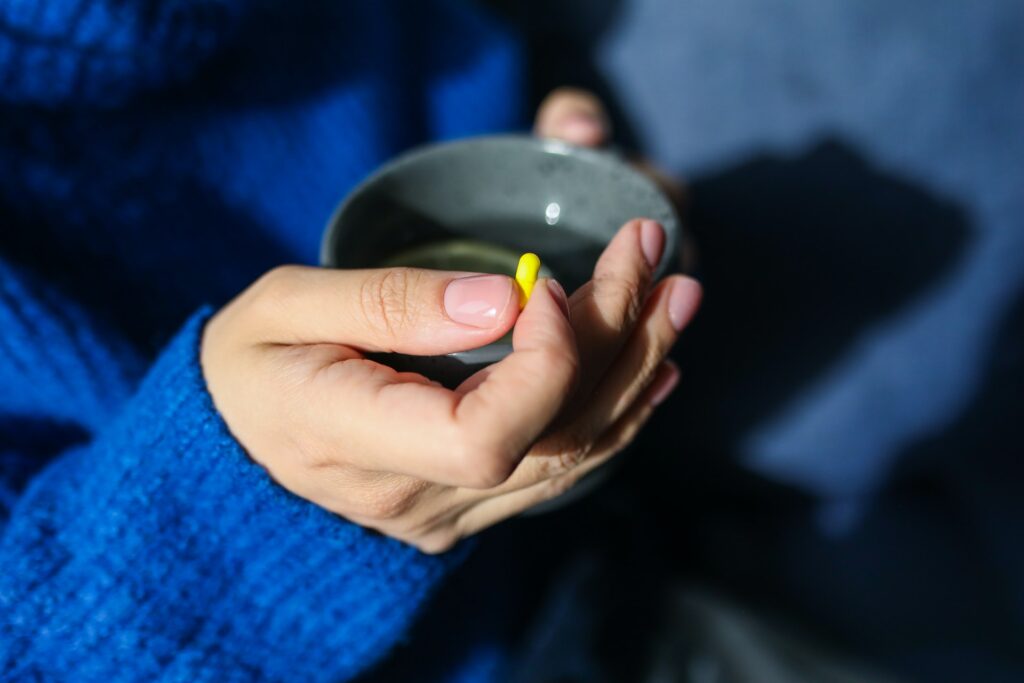
Person taking medicine at a drug rehab & alcohol rehab in Aberdeenshire or near Aberdeenshire
There is a range of treatment programmes offered at drug and alcohol rehab in Aberdeenshire that all span various timeframes.
The length of your drug or alcohol rehab programme will also depend on the substance you are addicted to and the severity of your addiction.
For a sole alcohol detox or medically-assisted detox, patients are admitted to drug and alcohol rehab in Aberdeenshire for a minimum of seven days. This helps your medical team to manage withdrawal symptoms and prescribe detox medication if needed.
However, we recommend entering rehab for at least 28 days as this can help you heal physically and psychologically.
A month-long stay gives you plenty of time to complete a full course of detox and therapy before moving back home, giving you a solid chance of staying sober after drug and alcohol rehab in Aberdeenshire has been completed.
Some clients stay at drug and alcohol rehab for longer, anywhere between three months to a year.
Drug and alcohol rehab in Aberdeenshire isn’t a sentence, but it can help you change your life in the best possible way.
Drug and alcohol rehab facilities in Aberdeenshire are warm, welcoming places with staff that are invested in your well-being and recovery.
Get the help you need to beat addiction at a drug & alcohol rehab in Aberdeenshire by calling us today on 0800 088 66 86
What Are the Differences Between NHS and Private Rehab Treatment in Aberdeenshire and near Aberdeenshire?

As mentioned above, the NHS very rarely offers residential rehab places to patients anywhere in the UK, including in Aberdeenshire.
At private drug and alcohol rehab in Aberdeenshire, residential treatment is the most highly recommended form of treatment as it produces the best results.
This form of rehab treatment is considered the most effective and helps to reduce the chances of relapse.
Tailored rehab programmes are a huge benefit to private treatment and help you to achieve recovery milestones.
In a private drug and alcohol rehab facility in Aberdeenshire, you can choose single or dual occupancy rooms and an adjoined bathroom if you wish.
One of the biggest benefits of residential rehab treatment in Aberdeenshire is the high level of care that is offered 24 hours a day.
This means you can gain the vital support needed to overcome your addiction at any and all points of your drug and alcohol rehab journey.
Whilst NHS treatment in Aberdeenshire is free, it is mostly offered as outpatient rehab treatment.
Whilst outpatient drug and alcohol treatment in Aberdeenshire can be a great way to treat addiction, it is not recommended for those with severe addictions.
With NHS drug and alcohol rehab treatment, long waitlists can be detrimental to a person wanting to recover from addiction immediately.
Other organisations for drug rehab and alcohol rehab in Aberdeenshire and near Aberdeenshire
Below is a list of other organisations that offer free rehab support and advice for addiction in and around Aberdeenshire:
1. Addaction, near Aberdeenshire
Address: 480 Union St, Aberdeen AB10 1TS
Telephone: 01224 218 120
Website: https://www.wearewithyou.org.uk/help-and-advice/
2. Alcohol & Drugs Action, near Aberdeenshire
Address: 7 Hadden St, Aberdeen AB11 6NU
Telephone: 01224 577 120
Website: http://www.alcoholanddrugsaction.org.uk/
You can also reach out to a number of helplines, including Mind UK, YoungMinds, Rethink Mental Illness, Samaritans and Papyrus.
The NHS [7] is also there to help you with support, advice and emergency treatment.
Whatever help you need to beat addiction in Aberdeenshire, let our experts help by calling us for free on 0800 088 66 86
Inpatient vs Outpatient Drug & Alcohol Rehab Treatment in Aberdeenshire

Therapist speaking with patients during group therapy at drug & alcohol rehab in Aberdeenshire
Drug and alcohol rehab treatment falls into two categories: inpatient and outpatient.
Inpatient treatment involves moving from home to a designated rehab facility in Aberdeenshire.
This form of treatment requires you to check yourself into your chosen rehab clinic for a set amount of time to receive treatment.
During this time, you will be able to benefit from 24-hour support in a fully-staffed and supervised drug and alcohol rehab environment.
On the other hand, outpatient drug and alcohol rehab treatment is considered a more part-time form of rehab treatment.
These programmes offer great flexibility for those with mild addictions, meaning they can still partake in important commitments outside of drug and alcohol rehab in Aberdeenshire.
Outpatient treatment involves patients living at home and commuting each day to treatment sessions at a rehab or clinic in Aberdeenshire, such as family therapy and group therapy.
Outpatient drug and alcohol rehab treatment doesn’t revolve around a structured routine, which can be challenging for those with a serious addiction.
Residential drug and alcohol rehab treatment will be in your best interest if you struggle with severe drug and alcohol problems and need an environment fully dedicated to recovery.
If you’re unsure which form of rehab treatment would be most suitable for you, speak to a member of our friendly team by calling us now on 0800 088 66 86
What is a Medically Assisted Drug or Alcohol Detox?
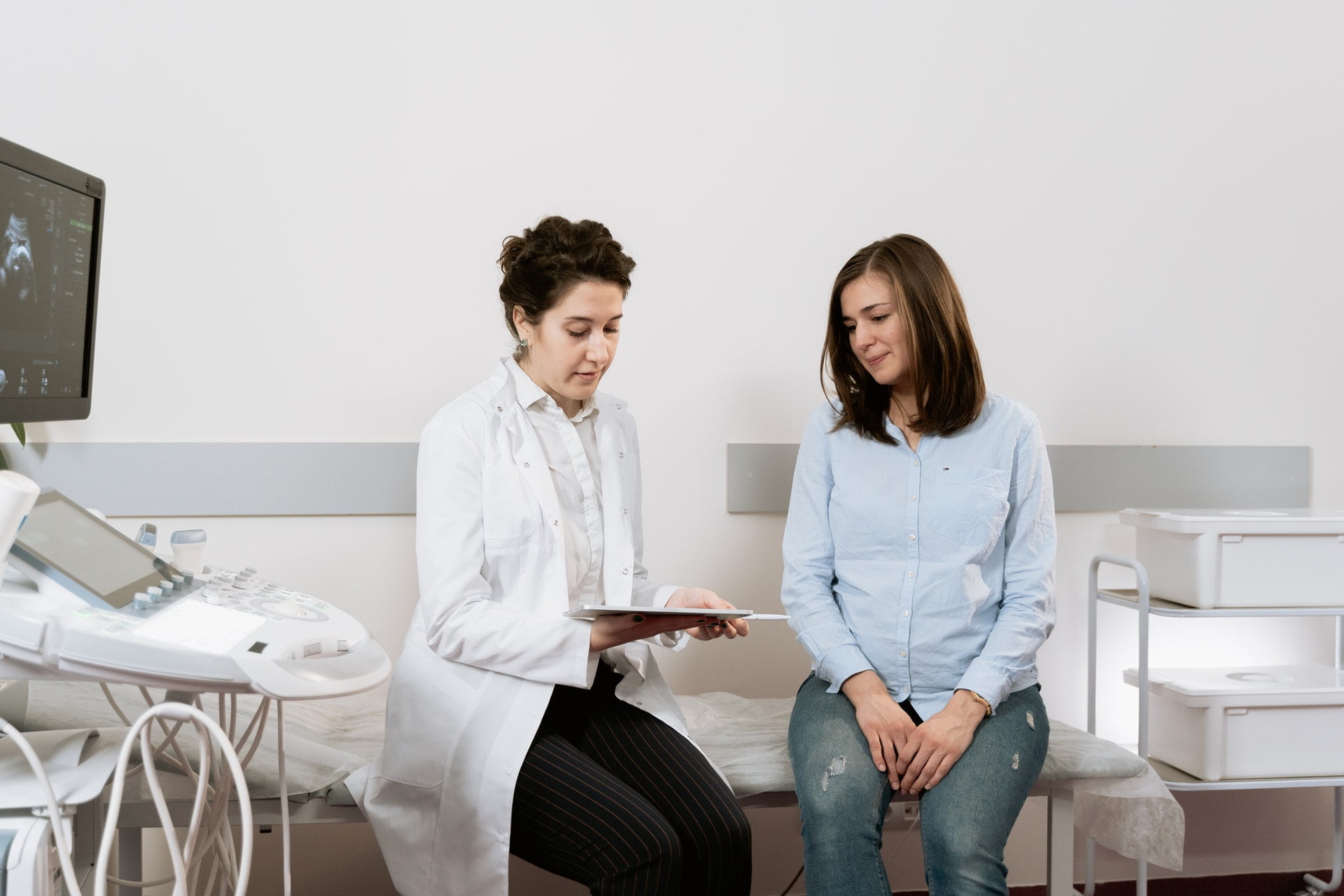
Doctor and patient discussing alcohol addiction at a drug rehab & alcohol rehab in Aberdeenshire
As the first stage of rehabilitation through Rehab Recovery in Aberdeenshire, individuals are usually encouraged to take part in a drug or alcohol detox.
This is the process in which individuals cut down or cut out the substance they are addicted to (if the substance is physically addictive) and use rehab support to manage the withdrawal symptoms that they may experience as a result.
In cases of some physically addictive substances, and situations in which the individual is experiencing serious or life-threatening withdrawal symptoms, it may be necessary to employ medical interventions or medically assisted detox procedures whilst at drug and alcohol rehab.
This includes the prescription of specialised drugs and detox medications that are designed to combat the negative withdrawal effects and make the withdrawal process safer and more effective in the long term.
The possibility of dangerous withdrawal symptoms and the chance to prescribe effective medication as and when it is needed is one of the key reasons why residential rehab in Aberdeenshire is so important.
Studies show [8] that combining biomedical interventions with further treatments and therapies makes recovery more effective, both in treating substance addictions and the effects associated with them, and achieving long-term sobriety after drug and alcohol rehab in Aberdeenshire has ended.
Get the help you need to beat addiction at a drug & alcohol rehab in Aberdeenshire by calling us today on 0800 088 66 86
Alcohol Detox & Alcohol Rehab in Aberdeenshire
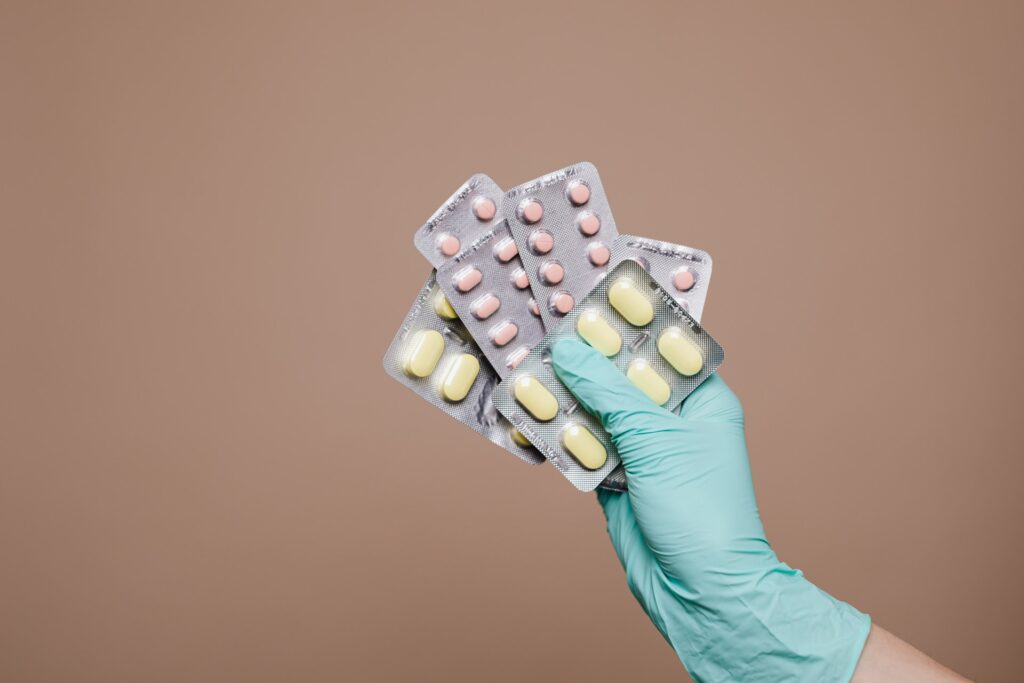
Rehab worker holding drugs at a drug and alcohol rehab in Aberdeenshire
If you are struggling with alcohol abuse problems or alcohol addiction and want to seek professional drug and alcohol rehab help, alcohol detoxification will be the first step in the process.
Detoxification usually takes place within your chosen residential rehab facility in Aberdeenshire. It involves the removal of all traces of alcohol from the body to help overcome physical dependency.
When addictive substances are removed from the body, the brain begins to adjust to the drop.
This usually means that you will start to experience alcohol withdrawal symptoms or alcohol withdrawal syndrome, in extreme cases even Wernicke’s Encephalopathy.
When treating alcohol addiction at home or at drug and alcohol rehab in Aberdeenshire, Librium (the name brand for Chlordiazepoxide) is often used to help manage these withdrawal symptoms and keep their worst aspects at bay, such as seizures.
This is known as pharmacological intervention and can also help ease anxiety and pain during drug and alcohol rehab treatment.
Most alcohol detoxes last for around ten days but can continue for more than two weeks, depending on the severity of your alcohol problem and the structure of your drug and alcohol rehab treatment in Aberdeenshire.
Detoxes can be very challenging, but it will help you become physically stable and prepare to fully engage with rehab therapy.
After your detox is complete, you will continue to stay at your chosen alcohol rehab clinic in Aberdeenshire for around three weeks to make a well-rounded recovery through an extensive programme of therapy, drug and alcohol relapse prevention and trigger identification.
Home detoxes are also a cheaper option for those who may not be able to commit to residential treatment in Aberdeenshire, but being in a controlled rehab environment can be crucial to recovery.
They involve medication being sent to your home address to reduce withdrawals whilst maintaining contact with your drug and alcohol rehab clinic or local GP in Aberdeenshire to ensure your safety.
Get the help you need to beat alcohol addiction at a rehab centre in Aberdeenshire by giving our team a call on 0800 088 66 86
Cocaine Rehab in Aberdeenshire and near Aberdeenshire

Therapist at a drug rehab & alcohol rehab in Aberdeenshire
Cocaine is a stimulant often snorted or rubbed into the gums. It can make users feel excited and confident as well as panicky and impulsive and, due, to its widespread abuse, is a substance commonly treated at UK drug and alcohol rehab clinics.
Cocaine takes around 30 minutes to take effect and can lead to heart attacks and strokes.
If you are struggling with cocaine abuse or cocaine dependence, it is never too late to seek drug and alcohol rehab help.
Although cocaine is very addictive, a professional rehab in Aberdeenshire can help to fight even the most severe of addictions.
During your time at your chosen drug and alcohol rehab, you will focus on psychological healing.
This is because cocaine isn’t a physically addictive substance and therefore does not require a detox process at drug and alcohol rehab in Aberdeenshire.
You will instead engage in a wide range of rehab therapies and other treatments designed to break the behaviours and thought patterns that encourage cocaine use, replacing them with healthier thoughts and lifestyle choices.
Overcome cocaine addiction with the help of drug & alcohol rehab in Aberdeenshire by calling our experts on 0800 088 66 86
Heroin Rehab in Aberdeenshire and near Aberdeenshire

Doctor speaking with a drug and alcohol rehab patient in Aberdeenshire
Treatment for heroin addiction usually involves a combination of detoxification, therapy, medication and continued support after heroin treatment at a drug and alcohol rehab in Aberdeenshire has concluded.
Because heroin is such a highly addictive substance, it requires an intense detox process at a medically-supported drug and alcohol rehab environment to overcome the initial physical dependence.
By completing this in a specialist drug and alcohol rehab clinic in Aberdeenshire, you will be able to minimise discomfort and dangers and help your body readjust to life before heroin.
Attempting to detox from heroin at home is not advised by Rehab Recovery and can result in death.
Heroin is a seriously fatal drug that causes many addictions worldwide. These addictions require specialist care and rehab support to overcome the many dangerous symptoms of heroin addiction.
Beat heroin addiction with the help of drug & alcohol rehab in Aberdeenshire by calling our team today on 0800 088 66 86
Cannabis Rehab in Aberdeenshire and near Aberdeenshire

Patient speaking with a therapist about alcohol addiction at a drug & alcohol rehab in Aberdeenshire
Although cannabis is not a physically addictive substance, it can be psychologically addictive and require rehab support to fully overcome.
It is considered the most abused substance in the UK, with millions of people consuming it each year and needing dedicated rehab treatment in Aberdeenshire to overcome it.
Cannabis addiction or cannabis use disorder can have short and long-lasting effects on an individual, destroying every aspect of their life, from their careers to relationships.
Most notably, long-term cannabis users often describe feeling apathetic and depressed, as well as altering other mental health problems and even risking psychosis, which can further complicate rehab treatment.
Drug and alcohol rehab can help you to turn things around.
By beginning rehab therapy and stepping away from distractions, you can heal and create healthy coping mechanisms to avoid cannabis abuse in the future.
To learn how a drug & alcohol rehab in Aberdeenshire can help you beat cannabis addiction, give us a call on 0800 088 66 86
Therapies Offered at Alcohol & Drug Rehab in Aberdeenshire or near Aberdeenshire

Family counselling session at drug & alcohol rehab in Aberdeenshire
Another amazing benefit to drug and alcohol rehab in Aberdeenshire is that you will find a wide variety of therapies on offer.
- Cognitive Behavioural Therapy (CBT)
- Dialectical Behavioural Therapy (DBT)
- Brief Interventions
- Contingency Management
- Acceptance and Commitment Therapy (ACT)
- Eye Movement Desensitization and Reprocessing (EMDR)
- Rational Emotive Behaviour Therapy (REBT)
- Motivational Interviewing (MI)
- Motivational Enhancement Therapy (MET)
- Holistic Therapies (equine therapy, music therapy, mindfulness, art therapy, drama therapy, adventure therapy, etc.)
- Group Therapy
- Individual therapy
- Family Therapy
- Co-dependency Treatment
- 12-Step Facilitation Therapy (TSF)
Through a combination of talking therapies and holistic therapies, clients can make a thorough recovery whilst at drug and alcohol rehab in Aberdeenshire.
Whilst it can sometimes be challenging to speak about the root of your drug or alcohol addiction and make discoveries about your substance use, it is worth it and will help you to heal.
Therapy will help you on your way to maintaining long-lasting sobriety after drug and alcohol rehab in Aberdeenshire has concluded.
Discover the wonderful benefits of personalised addiction treatment at a drug & alcohol rehab in Aberdeenshire – reach out to us on 0800 088 66 86
What is a Dual Diagnosis at Drug & Alcohol Rehab in Aberdeenshire?

A male patient talking to a female therapist at a drug & alcohol rehab in Aberdeenshire or near Aberdeenshire
Many people who are diagnosed with a substance use disorder and attend drug and alcohol rehab in Aberdeenshire and across the world will also suffer from a co-occurring mental health condition.
This is known as a dual diagnosis and it is incredibly important that patients with a dual diagnosis receive the right treatment, both at drug and alcohol rehab in Aberdeenshire and out of it.
By opting for private drug and alcohol rehab in Aberdeenshire, you can benefit from treatment tailored to your exact needs, including mental health support at rehab.
Although NHS addiction treatment can be beneficial for some people and is a viable alternative to private rehab, it often fails to take into consideration the needs of those with a dual diagnosis.
If a dual diagnosis is ignored, it can cause many problems and put the individual in danger. After you leave drug and alcohol rehab in Aberdeenshire, this could result in a relapse or even death through overdose when these root causes of addiction are not addressed.
- Anxiety Disorder
- Depression
- Bipolar Disorder
- Schizophrenia
- Eating Disorders
- Borderline Personality Disorder (BPD)
- Post-Traumatic Stress Disorder (PTSD)
- Obsessive-Compulsive Disorder (OCD)
At Rehab Recovery, we work with specialist dual diagnosis providers in the Aberdeenshire area, helping you get the most out of drug and alcohol rehab in Aberdeenshire.
So, for treatment at a first-class drug and alcohol rehab to achieve sustainable, long-lasting sobriety, reach out to our drug and alcohol rehab referral team today.
For comprehensive addiction and mental health treatment at a drug & alcohol rehab centre in Aberdeenshire, call us for free on 0800 088 66 86
Why Are Relapse Prevention and Aftercare So Important After Drug & Alcohol Rehab in Aberdeenshire?
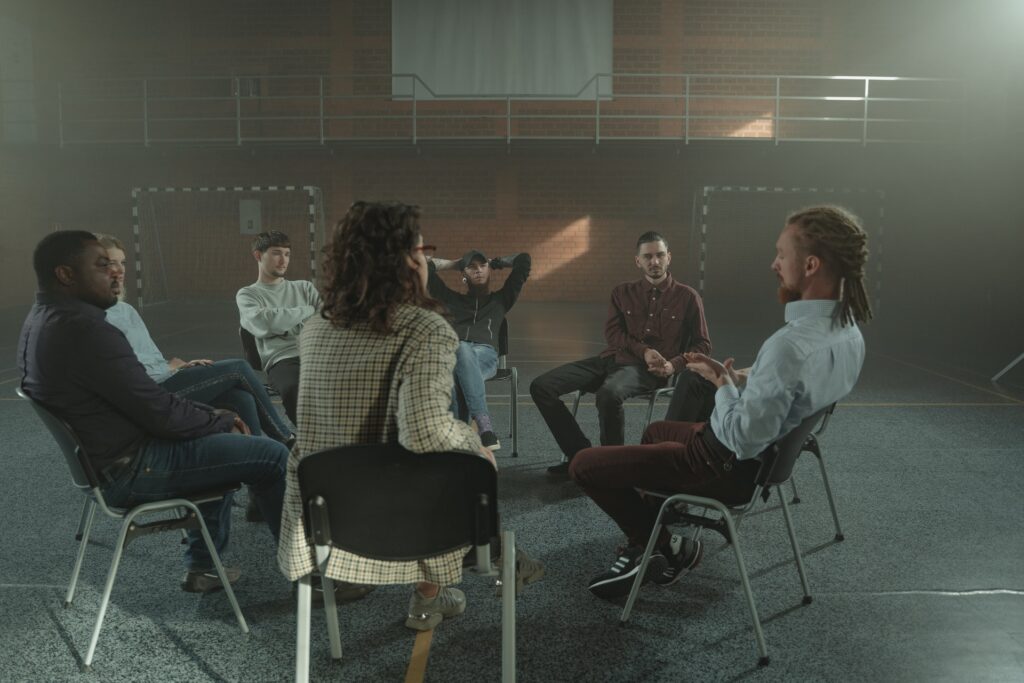
Alcohol support group discussing drug & alcohol rehab in Aberdeenshire
Before your drug and alcohol rehab programme in Aberdeenshire ends, you will work closely with support workers and rehab staff to implement a thorough drug and alcohol relapse prevention plan.
This includes creating a dedicated document containing information about your addiction, triggers and the coping mechanisms you developed during your time at drug and alcohol rehab in Aberdeenshire.
Relapse prevention workshops are also held in many private drug and alcohol rehab clinics that help you to work on avoiding partaking in addictive behaviour once you return home.
Relapse prevention is an incredibly important part of your drug and alcohol rehab journey and will help you to solidify the progress and milestones you have achieved during your time in treatment.
Following this is the addition of continued aftercare from your chosen drug and alcohol rehab clinic in Aberdeenshire. Aftercare refers to an extension of your programme that continues when you return home.
It mostly consists of continued outpatient therapy sessions to help you build upon the skills and insights you developed whilst at drug and alcohol rehab in Aberdeenshire.
- Alcoholics Anonymous (AA) [9]
- Narcotics Anonymous (NA) [10]
- Cocaine Anonymous (CA) [11]
- SMART (Self Management And Recovery Training) Meetings [12]
- Al-Anon Family Meetings [13]
- Alateen [14]
We understand that recovery isn’t a linear process and that sometimes relapses happen.
If one does, rest assured your rehab aftercare staff will work with you to help you get back on track and feel like your best self in no time.
Match your stay at a drug & alcohol rehab in Aberdeenshire with an equally effective aftercare plan by giving us a call today on 0800 088 66 86
What Can I Do to Get Drug & Alcohol Rehab Help in Aberdeenshire Today?

Man typing on a phone at a drug and alcohol rehab in Aberdeenshire
For more information and to kickstart your new sober life through person-centred care at a drug and alcohol rehab in Aberdeenshire, reach out to Rehab Recovery today.
All drug and alcohol rehabs in the UK must be registered and audited by the Care Inspectorate (CI) [15] in Scotland and the Care Quality Commission (CQC) [16] in England and Wales.
We also offer drug and alcohol rehab services in a variety of places within Aberdeenshire, Scotland and across the UK, including Aberdeen, Dundee, Edinburgh, Glasgow, Inverness, Perth, Paisley, Hamilton, Livingston and Stirling.
To learn how a drug & alcohol rehab in Aberdeenshire can help you beat addiction, give us a call on 0800 088 66 86
References for Drug & Alcohol Rehab in Aberdeenshire
[2] https://pmc.ncbi.nlm.nih.gov/articles/PMC4394369/
[3] https://www.inveruriemedicalpractice.scot.nhs.uk/help-and-support-service-types/addiction/
[6] https://www.nice.org.uk/guidance/health-protection/drug-misuse
[7] https://www.nhs.uk/Live-well/addiction-support/drug-addiction-getting-help/
[8] https://pubmed.ncbi.nlm.nih.gov/28387530/
[9] https://www.alcoholics-anonymous.org.uk/intergroups/aberdeen-district-intergroup/
[10] https://meetings.ukna.org/meeting/search
[11] https://www.cascotland.org.uk/meetings?search
[12] https://uk.meetings.smartrecovery.org/meetings/?location=Aberdeenshire&coordinates=50
[13] https://al-anonuk.org.uk/groups/midstocket-aberdeen-thursday/
[14] https://al-anonuk.org.uk/alateen/


